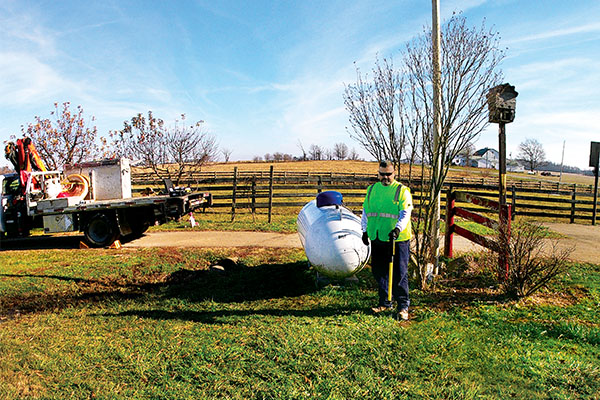Detect underground lines; dig safely
On Sept. 16, 2019, in Farmington, Maine, a damaged and leaking underground propane line fueled a deadly explosion. This catastrophe, and resulting new regulations, have convinced many propane marketers of the benefits of locating, marking and avoiding underground lines.
New regulations
The Farmington tragedy motivated Maine’s legislature to enact LD 1892, An Act to Make Changes to the So-called Dig Safe Law, and on March 17, 2020, Gov. Janet Mills signed LD 1892 into law.

Todd Shreve of Superior Plus Propane uses a Pipehorn locator to sweep and identify all lines prior to excavation. Photo by Noel Haro/Superior Plus Propane
A letter from the Maine Public Utilities Commission clarifies how the requirement to locate underground propane facilities has changed. Previously, the law required locating only jurisdictional propane systems. To comply, “you must provide the location of all your underground propane facilities, including those considered as ‘non-jurisdictional.’ … Further, you will be obligated to mark these facilities … upon receipt of a notice of planned excavation.”
Along with heightened expectations, LD 1892 has harsher consequences, increasing first-time offense limits to $1,000 and second occurrences within 12 months to $10,000.
On July 1, 2020, Florida Gov. Ron DeSantis signed HB 1095, amending the Underground Facility Damage Prevention and Safety Act. Wendy Schaefer of Sunshine 811, a nonprofit that helps utilities dig safely, says in a summary: “The revised law, which establishes new noncriminal violations, enhanced penalties, more enforcement entities and incident reporting requirements, goes into effect July 1, 2020.”
Some propane company operators in Florida have voluntarily joined the 811 system, including Blossman Gas’ Orlando location.
“Here in Florida, we have joined Sunshine 811, which helps to prevent costly repairs, utility outages, property damage, possible environmental issues, fines and, more importantly, possible injuries,” says Peter Dawson, general manager.
Problem: unmarked lines
Operators say that unmarked lines are an issue and that electrical strikes are the most dangerous. There are many opportunities to hit private, unmarked electrical lines that are beyond the meter. Backyards are often minefields of power lines feeding outbuildings, lighting, pet fencing, swimming pools and irrigation systems. Damaging or cutting these lines can result in service interruption, injury, downtime, fines and embarrassment.
“For whatever reason, some things just don’t get marked, so we still will use Pipehorn locators, which are easy to use and help us avoid unneeded damage to underground lines,” Dawson says.
Solution: right equipment and practices
Whether locating jurisdictional systems, lines from the tank, private lines or verifying marks, the right locating equipment and practices can better protect customers, property and employees. A locating tool that has an ultra-high frequency assists with checking marks and finding all lines, especially when you can’t connect.
Performing a “safety sweep” using an ultra-high frequency locator is a technique for finding unmarked lines that might be in the dig area.
In addition, some operators also locate their own existing propane lines.
“Locates are an important part of our business culture,” says Dawson. “It’s not just about the safety of our customers, the employees and the environment; it also helps to set your business apart. … Locating existing lines shows the customer that you are a professional and have the right equipment for the job.”
Choosing safer digging
Operators say the biggest benefit of finding and verifying underground lines with locating equipment is increased safety. Another benefit is that locating protects company assets and customer property. Other advantages are decreased fines and penalties and increased productivity, all leading to a better bottom line.
No one wants accidents. No one wants damages. Safety is of utmost importance, and safety is good business.
Matt Monroe is sales and marketing director at Pipehorn, a locating technology provider. He can be reached at 205-956-3710.
NOTE: The opinions and viewpoints expressed herein are solely the author’s and should in no way be interpreted as those of LP Gas magazine or any of its staff members.

















It should be noted that many propane companies frequently assist customers with line locating. However, the law in Maine only requires Digsafe registration for underground lines located in public right of ways and owned by the operator.